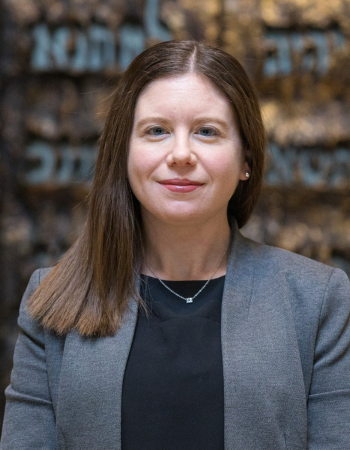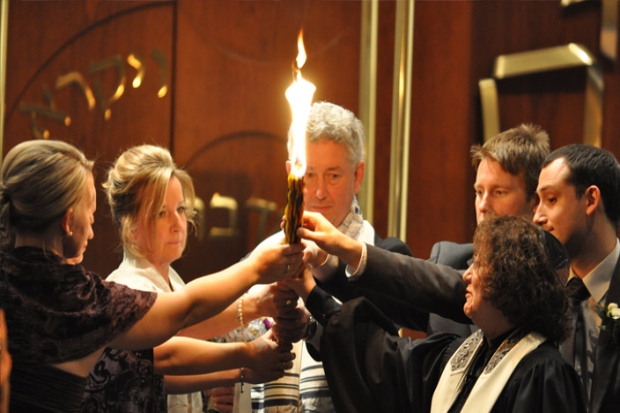The beautiful ritual of Havdalah is the the ceremony marking the end of Shabbat. According to Jewish tradition, the Havdalah service may be recited through the following Tuesday. Nevertheless, Havdalah is most often observed on Saturday evening, marking the end of the day of rest.
Havdalah is a Hebrew word meaning “division” or “separation” and is the name of this ritual that formally ends Shabbat, “separating” it from the beginning of the new week. Havdalah is a short, participatory service infused with music, symbols, and meaning. The basis for Havdalah comes from the fourth of the Ten Commandments: “Remember the Sabbath day to sanctify it” (Exodus 20:8). The Rabbis decided that “remembering” Shabbat required “sanctifying it” at both its beginning (Kiddush) and its end (Havdalah).
This service has become popular at synagogues, summer camps, retreats, and at home. As the sun sets and stars become visible in the night sky, groups gather in circles to share in this ritual together. Jewish communities around the world and across denominations use a melody for the Havdalah blessing composed by Debbie Friedman(z”l) often using guitar and other instruments to enrich the experience.
Traditionally, the Havdalah ritual has five parts, each highlighting different symbols and senses:
- The service begins with an introductory Hebrew paragraph comprised of quotations from biblical verses.
- The central element of the service consists of four blessings. The first is a blessing over a cup of wine: Baruch atah Adonai, Eloheinu Melech haolam, borei p’ri hagafen. “Blessed are You, Adonai our God, Ruler of the universe, Creator of the fruit of the vine.”
- Next, a blessing over fragrant spices in a special spice box: Baruch atah Adonai, Eloheinu Melech haolam, borei minei v’samim. “Blessed are You, Adonai our God, Ruler of the universe, Creator of many kinds of spices.”
- This is followed by a blessing over light, using a special braided Havdalah candle with two or more wicks: “Blessed are you, Adonai, our God, Ruler of the universe, Creator of the lights of the fire.”
- A final blessing that distinguishes Shabbat from the rest of the days of the week: Baruch atah Adonai, Eloheinu Melech haolam, hamavdil bein kodesh l’chol ben or l’choshech bein Yisrael laamim bein yom hash’vi-i l’sheishet y’mei hamaaseh. Baruch atah Adonai hamavdil bein kodesh l’chol. “Blessed are you, Adonai, our God, Ruler of the universe, who makes a distinction between the holy and the secular, between light and darkness, between Israel and the other nations, between the seventh day and the six working days. Blessed are you, Adonai, our God, who makes a distinction between the holy and the secular.”
In many families and communities, the Havdalah service concludes with a song, such as "Eliyahu HaNavi" (Elijah the Prophet), "Shavua Tov," or both. We can think of Shabbat as “a foretaste of the World-to-Come, [so] we are sad at its departure. Yet we mix our sadness with a declaration of our faith in the coming of the ‘never-ending Shabbat,’” by reciting these future-looking, hopeful songs.
There are many layers of deeper meaning of the Havdalah blessings and symbols. In some communities, a different person holds each symbol, lifting it up or passing it around during its blessing. Each symbol relates to our senses: wine is for taste; the spices are for smell; the candle is for sight; the blessings are spoken, sung, and heard. We use our sense of touch when we pass around these ritual objects, tangible reminders of separation, and when we join hands or link arms as a community.
Rabbi Shimon ben Lakish teaches in the Talmud (Beitzah 16a) that we each receive an additional soul, a neshama yetera, on Shabbat, which will sadly depart at the end of this sacred day. The spices have come to symbolize this additional soul. Although we are saddened when this soul leaves as Shabbat draws to a close, we retain the memory of Shabbat when we smell this fragrance.
All of these Havdalah rituals allow us to remember the blessings of the week that is ending, particularly the holiness of Shabbat. Havdalah enables us to ceremonially transition into a new week, full of potential and blessings.
This piece was originally published in Ten Minutes of Torah, a daily email on a topic of Jewish interest. Sign up now to add 10 minutes of Jewish learning to your life each day!


